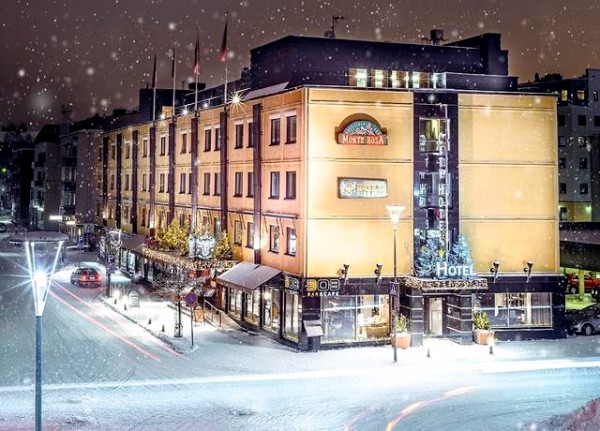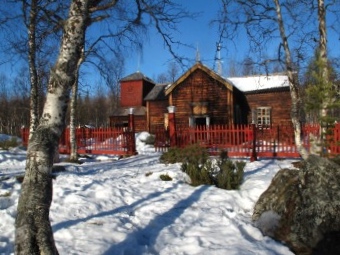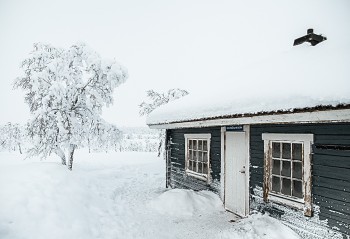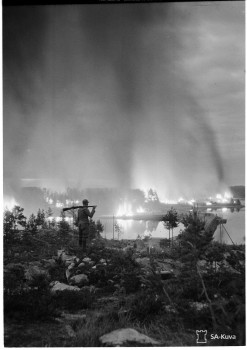“I was beat, so I went to lie down on a raft of moss, and right then I saw the world in a flash, the way it might be someday. It was a world that would be both man and woman, playful and loving, flooded with tenderness and pleasure, and everybody would be good to each other and everybody would just be what they are, not bad or good, and no words at all, just the senses.”
 Author Rosa Liksom grew up in a Lapland village of eight houses, and she sets much of the action of this novel in Lapland as she creates, through flashbacks, the life story of an unnamed woman, now elderly, who is looking back on her life and her experiences in Finland during the tumultuous time during and after World War II. An idealistic, even romantic, child, as shown in the opening quotation, the old woman as a young girl loves scouting and summer camp, which teaches her how to be hard-working to the point of self-sacrifice and helps prepare her for her future role as a mother of soldiers. In a casual tone, she explains that she has learned that love is a “battle that begins with hostilities from the man’s side and ends with his moral victory, and a woman has to learn to accept that and still love the man purely and sincerely.” Even scouting, she learns, is “based on German idealism and the German feeling of superiority, plus hatred of the Russkies.” For her own life, the “most basic thing is “the holy trinity of home, faith, and fatherland.” With all these absolutes governing her life from childhood into womanhood, she allows herself little opportunity to explore alternatives that most of us take for granted.
Author Rosa Liksom grew up in a Lapland village of eight houses, and she sets much of the action of this novel in Lapland as she creates, through flashbacks, the life story of an unnamed woman, now elderly, who is looking back on her life and her experiences in Finland during the tumultuous time during and after World War II. An idealistic, even romantic, child, as shown in the opening quotation, the old woman as a young girl loves scouting and summer camp, which teaches her how to be hard-working to the point of self-sacrifice and helps prepare her for her future role as a mother of soldiers. In a casual tone, she explains that she has learned that love is a “battle that begins with hostilities from the man’s side and ends with his moral victory, and a woman has to learn to accept that and still love the man purely and sincerely.” Even scouting, she learns, is “based on German idealism and the German feeling of superiority, plus hatred of the Russkies.” For her own life, the “most basic thing is “the holy trinity of home, faith, and fatherland.” With all these absolutes governing her life from childhood into womanhood, she allows herself little opportunity to explore alternatives that most of us take for granted.
The complex political conditions in Finland, as they affect the action which follows, are briefly established in the early pages here, then later developed in greater detail. Between 1939 and 1945, Finland faces three wars, which influence the novel’s narrative. For the four months from November 1939, to March 1940, Finland fights the “Winter War” with the Soviet Union, defending Finnish land against Soviet aggression. A year later, from June 1941, to September 1944, the Finns work with Nazi Germany against the Soviet Union in the “Continuation War.” Ultimately, Finland turns on the Germans who have been stationed in Finland during that war and fights the “Lapland War” from October, 1944 – April 1945 to keep Finland independent of both the Germans and the Soviets. While all this is going on in the wider world, the speaker is growing up, and her teen years are harried, with the death of her father, her mother’s relentless beatings of her, sexual abuse, and not surprisingly, her overwhelming longing to get away from home. As she prepares to leave, she informs the reader that she intends to “do like Germany did and plan a surprise maneuver…marry the first man I come across…[and] make a clean sweep, a fresh start, like the Fuhrer did in the spring of 1930.” Her relationship with “the Colonel,” thirty years older than she, becomes the main impetus to the action for the rest of the novel.

Pohjanhovi Hotel in Rovaniemi, the capital of Lapland, where the speaker and the Colonel met with many members of the army and government.
Through flashbacks, author Rosa Liksom develops additional information about the speaker’s childhood, the death of her father, and her job as a schoolteacher, but she also gives some background about the presence of “the Colonel” in her life. An officer of the Finnish army and a friend of her father whom she had first met when she was four years old, the Colonel had a checkered reputation among women in the community, but he filled a gap when her father died, and he came to her thirteenth birthday party, two years after her father’s death. He also begins to “take over the reins” at her house, so terrifying her mother that her mother runs off to Helsinki, and becomes an actress. In chapters of compressed time, not marked by specific dates, the speaker grows up, and her early relationships vanish from the story, as she enters a new phase as a teacher. Shortly afterward, she is visited by the Colonel, who beds and becomes engaged to her in the space of two short paragraphs. Though theirs is a passionate, often overwhelming affair for her, marriage is not an immediate possibility. He is already married. When her teaching year ends, she becomes the Colonel’s private secretary, traveling with him as he performs his duties, often acting as his hostess. Accompanying the Colonel on all his trips, she is able to observe his relationships with the “Finnish heavyweights” in government, in addition to representatives of the Third Reich.

Pielpajarvi Church, in Inari, Lapland, to which the dead were brought during the Winter War with the Soviets.
Trips to Berlin and to Poland expand the speaker’s horizons, but when the Winter War starts against the Soviets in 1939, “the men of Lapland were put on a train, caps slapped on their heads,” and “they were bringing the dead into Inari Church less than two weeks later.” With the Continuation War, in which the Finns fought against the Soviets that summer alongside the Nazis, the speaker becomes aware of “the hate. I knew. And so did everyone else in Finland. If you knew how to read, you knew what the Nazis were doing.” Still, the war partnership with Germany continues, and the speaker is forced to be involved throughout the year – she is even present when the Fuhrer and Albert Speer appear. Horror stories of this three-year Continuation War dominate the action in this section – including the arrest of Albert Speer, which the speaker witnesses – but even this episode is told casually, as if it is “normal” behavior, and dropped from discussion within a sentence or two. The withdrawal of the Germans, who “set fire to every headland and hollow …and threw grenades into barns and sheep sheds,” occupies only a single page. The eventual marriage of the speaker and the Colonel after their ten-year engagement, takes place in a single paragraph.
As changes in the lives, thoughts, and values of the speaker and the Colonel begin to take place, author Liksom shows the speaker’s dedication to preserving their sick marriage: “We built a sanctuary together. I was the soul of our home,” the speaker says, and she blames herself for his vicious abuse of her. Eventually, the speaker does change, but the changes come without much narrative drama, as, indeed, does most of the action here, no matter how much the reader might hope for some big moments of recognition and enlightenment by the speaker. The focus on Finland during World War II, which gets little attention in US history books, provides much interest for readers, though dates for the historical events and the flashbacks for the speaker’s life would be helpful. Ultimately, the reader becomes involved in the action, not as an equal with the speaker, but more as a rational observer of the speaker and other characters, the period, and the complications of living in a country that is fighting both the Russians and the Germans at a critical time in western history.
ALSO by Rosa Liksom, reviewed here: COMPARTMENT NO. 6

Small blue house in the woods, near the lake, which is similar to the site of the action at the end of the novel.
Photos. The author’s photo appears on https://commons.wikimedia.org
Pohjanhovi Hotel in Rovaniemi, Lapland, where the narrator and the Colonel met with other army officers and those helping Lapland to stay free of the Soviets in 1939-40. https://www.trivago.com
Pielpajarvi Church, the ancient church in Inari, Lapland, to which the Lapp bodies were delivered during the brief Winter War against the Soviets. https://www.tripadvisor.com/
The burning of Rovaniemi, the capital of Lapland in 1944, as the defeated Germans depart: https://www.reddit.com
The small, blue house in the woods, beside a lake, is similar to the one which features in the conclusion of the novel. Many more dramatic photos of Lapland appear here on this site. http://raphaellemonvoisin.com


